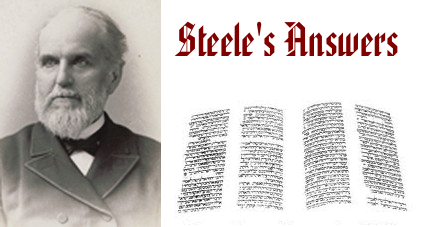
In His high-priestly prayer (John xvii.) Jesus prays for His disciples, "That they all may be one; as thou, Father, art in me, and I in thee, that they also may be one in us; I in them, and thou in me, that they may be made perfect in one." There are two kinds of church unity – mechanical like the staves of a barrel held together by the external pressure of hoops; and vital, like the roots, trunk and branches of a tree unified by the mysterious inward force which we call life. For which of these did Jesus pray? We find our answer in these words which He had just uttered, "I am the true vine" (John xv. 1). He prayed for vital unity, the only oneness worth praying for. This is infinitely superior to that illusory thing after which many are striving, a church unity through an exterior governmental uniformity. Partisan unity is a good machine for developing political power, but it cannot be used by the great unifier, the Giver and Lord of life, the Holy Spirit. It is He who unites all regenerate souls to Christ, and hence to one another, by His creative and vitalizing touch, drawing all into a marvelous oneness, "a oneness spiritually organic, in which each personality, while quite exempt from invasion, falls under the power of a divine cohesion whose results in spiritual harmony of life and action will develop forever." (Moule.) The invisible church is always one body, of which the risen Christ is the Head. It would be a pleasant thing to have the invisible exactly commensurate with the visible containing all the members of the invisible church and no others. But under the present dispensation this can never be, because the doorkeeper of the invisible is the heart-knowing Spirit, and the doorkeepers of the visible Church are fallible men. This is hinted at very strongly by Christ in the parable of the tares and the wheat growing together until the harvest. He evidently had in mind the visible Church, also, when He compared the kingdom of heaven to "a drag-net that was cast into the sea, and gathered of every kind; . . . and they gathered the good into vessels, but the bad they cast away" (Matt. xiii. 47). Such an instrument the Holy Spirit does not use. He takes the fish individually one by one; and no sorting is required. There is no discount of His results.

There can be no substitute for the Spirit in producing that unity which will endure all the changes and adversities of life, which will gain the approval of God as realizing His ideal of the Church, and which will savingly influence the world in answer to Christ's prayer for the oneness of all His disciples, "that the world may believe that thou hast sent me." This was the power which conquered the unbelief of the persecutors of the primitive Church. "Behold how these Christians love one another!" This love did not arise from similar intellectual tastes, nor from assent to the same creed, but from the indwelling in their hearts of the same Holy Spirit inciting to mutual love. When love declines through a relaxation of faith and the uprising of selfishness because of the withdrawal of the Spirit from His conscious indwelling, divisions, parties, cliques and sects arise. When we walk along the shore of the sea we observe pools here and there with their inhabitants separated from each other by rocks and stretches of sand, preventing communication between them. This is because the tide is out. But when it again rises and floods the beach the separate pools are swallowed up in the one great ocean. When the Spirit pours floods upon the dry grounds, self is submerged and Christian unity is restored.
— from The Gospel of the Comforter Chapter 20.



No comments:
Post a Comment